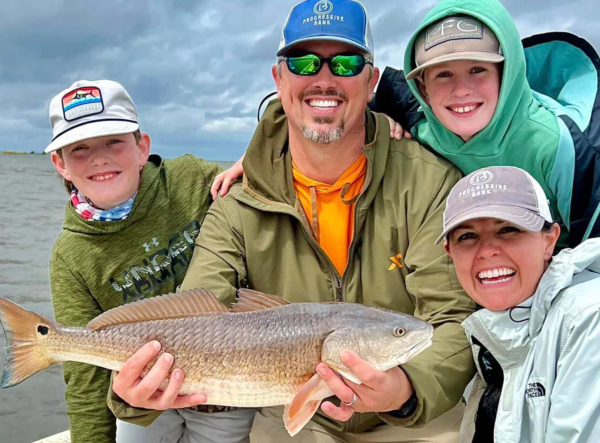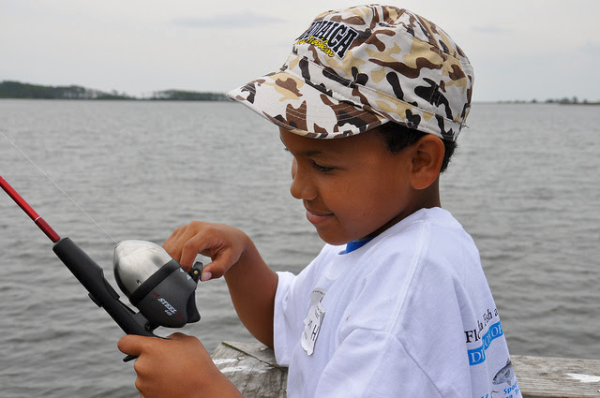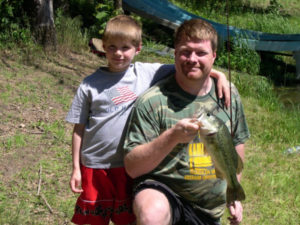Starting Young Anglers the Right Way
 |
If you’re reading this, you probably remember your first fish and its impact on your life. Most anglers get their start early on in their lives and the reason is because somebody decided to take them fishing. It’s always fun to introduce someone to fishing and the “take a kid fishing” mantra has been stated for years, but the important part is to make the experience enjoyable and catch fish.
Two guides, who live far apart and fish for different species, Wisconsin’s Rob Friedley and Louisiana’s Captain Joe Ezell, share some tips they’ve learned to keep kids catching and engaged on the water.
All about the action
The attention span of young ones is short and getting shorter in today’s world of electronics and video games, making it even more important to keep them engaged while fishing.
Ezell operates Whiskey Bayou Charters, primarily targeting redfish, and takes plenty of families with young kids on the water each year. “Kids are your toughest critics, and you have to be catching fish, or they’ll let you know about it,” he said. “That’s why you have to make it fun for them because they are the future of our sport. You have to keep them engaged.”
Friedley operates a multi-species guide service in Wisconsin’s Manitowish Waters while holding down a full-time job as a special education teacher. His background and years of experience fishing these waters make him an excellent choice for a guided trip for kids and their families.
“The biggest thing is to temper the expectations before a trip because, as we know, catching fish is not always immediate,” he said. “Kids now are used to video games and that instant gratification. A lot of times, fishing is not like that.”
No matter the size of the fish, the kids enjoy catching them, which is something both guides keep in mind at all times.
“If I look back at pictures of me with fish as a kid, I don’t remember the dimensions of the fish,” said Friedley. “I remember the experience of catching that fish and how it made me feel.”
It’s the same for Capt. Ezell in saltwater, and he’ll keep on active fish, no matter the size or species. “There are times when we are on a point with a bunch of small redfish and we’ll stay on them as long as they keep biting,” he said. “In trips with adults, we would have moved on long ago to search for bigger fish.”
It is not just about the fishing
Going on a guided fishing trip is primarily for fishing, yet both Ezell and Friedley understand that it’s important to include time for sightseeing and other fun activities.
“I let them play with the steering wheel or dig around in the bait bucket,” said Ezell. “We’ll also take boat rides to look at the alligators, birds, and nutria. You always have to find a way to maintain the action if the fish aren’t biting and I gauge the success of a trip with kids based on how long I can keep them out there on the water.”
Another tactic that Ezell stresses is having plenty of snacks on the boat; the more, the better. “I’ve found that a variety of things is the way to keep them entertained,” he said. “Juice boxes, gummy bears, and apple slices are all good. It helps to burn some time until the fish start biting again.”
Friedley uses a similar approach and seeks out undeveloped sections of lakes for the wildlife. “We can see eagles on many trips, and the river sturgeon are spawning in late June and early July. You can sometimes watch them breaching water,” he said. “Seeing a 6-foot long fish coming out of the water is like ‘Shark Week’ for them and very exciting. It’s important to create enthusiasm about being on the water outside of just catching fish.”
Tailoring gear for young anglers
When targeting redfish, Capt. Ezell says that a popping cork with live or dead bait is one of the most user-friendly ways for young people to catch fish. He uses the same basic setup as he does with adults, with a few minor adjustments, including using a jighead with a circle hook to prevent gut hooking so the fish will hook themselves.
“Since they are simply smaller, I’ll also use shorter rods, smaller reels, and shorter fluorocarbon leaders,” he said. “I’ll also loosen up the drags so they don’t panic and let go of the reel if they hook a big one. I’ve learned that from experience. The other adjustment is I’ll always go up a size in line to a 20-pound Seaguar TactX braid with a leader of 30 or 40-pound Seaguar Inshore since kids are generally rougher on gear and land fish with line rubbing the gunnels of the boat. The heavier line stands up to that abuse.”
During many trips, Friedley will work with clients young and old on the intricacies of jigging weed beds for walleye and smallmouth. Still, he always has a backup plan: live bait on a slip bobber for anglers of all ages, especially kids who love to watch a bobber disappear.
“I always have a slip bobber out for the chance of a big walleye, pike, or muskie,” he said. “We fish them on 7-foot medium light St. Croix spinning rods with 20- to 30-pound Seaguar Smackdown braid and 15-pound Seaguar Gold Label leader. That’s a heavier leader than usual and gives you some wiggle room if you catch something with teeth, but it also helps to compensate for young anglers who tend to horse the fish in. The line holds up very well and you still have a chance to land that huge muskie if you get one to bite.”
We should all take kids fishing, but it’s an entirely different experience than an outing with adults. We can share our love of fishing with the next generation by keeping things fun, no matter how well the fish are biting.
Seaguar Gold Label Fluorocarbon leader is available in twenty-five and fifty-yard spools in 2, 4, 6, 8, 10 & 12 lb tests for freshwater use, complementing the 15, 20, 25, 30, 40, 50, 60, and 80 lb test leaders available for saltwater.
Seaguar Smackdown Braid is available in high visibility Flash Green and low visibility Stealth Gray. It is available in 150- and 300-yard spools ranging from 10 to 65 lb test sizes.
Seaguar Inshore Fluorocarbon leader is available on 100-yard spools from 12 to 80 lb test.
Seaguar TactX is a camo-colored braid available from 10 to 80 lb. test in 150- and 300-yard spools.

